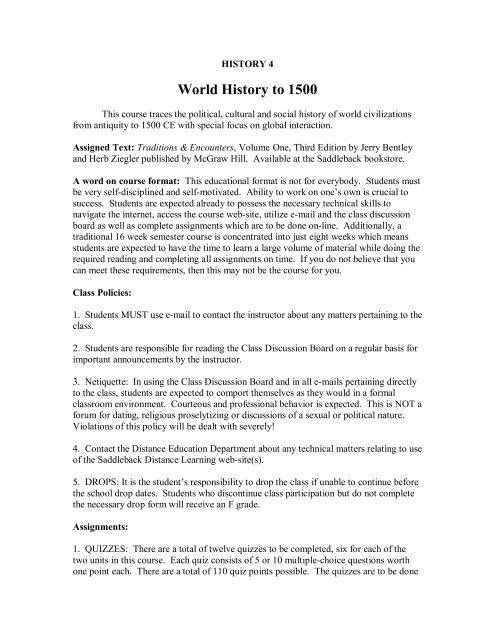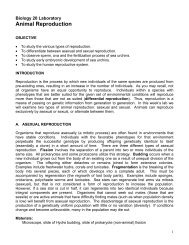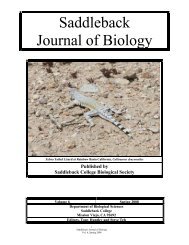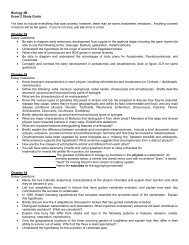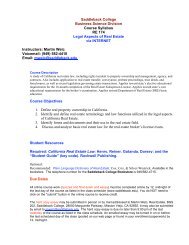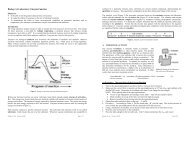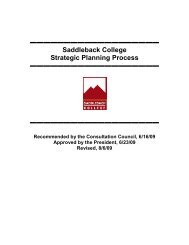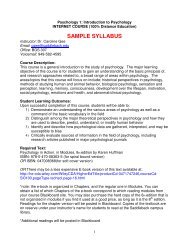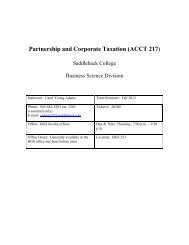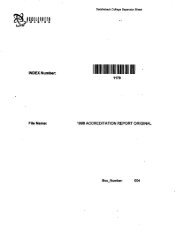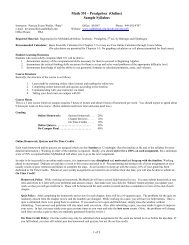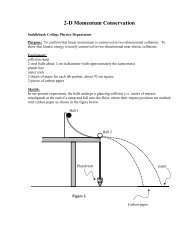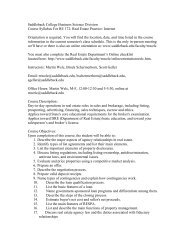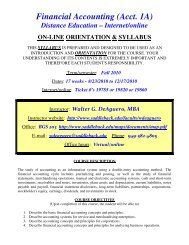World History to 1500 - Saddleback College
World History to 1500 - Saddleback College
World History to 1500 - Saddleback College
You also want an ePaper? Increase the reach of your titles
YUMPU automatically turns print PDFs into web optimized ePapers that Google loves.
HISTORY 4<br />
<strong>World</strong> <strong>His<strong>to</strong>ry</strong> <strong>to</strong> <strong>1500</strong><br />
This course traces the political, cultural and social his<strong>to</strong>ry of world civilizations<br />
from antiquity <strong>to</strong> <strong>1500</strong> CE with special focus on global interaction.<br />
Assigned Text: Traditions & Encounters, Volume One, Third Edition by Jerry Bentley<br />
and Herb Ziegler published by McGraw Hill. Available at the <strong>Saddleback</strong> books<strong>to</strong>re.<br />
A word on course format: This educational format is not for everybody. Students must<br />
be very selfdisciplined and selfmotivated. Ability <strong>to</strong> work on one’s own is crucial <strong>to</strong><br />
success. Students are expected already <strong>to</strong> possess the necessary technical skills <strong>to</strong><br />
navigate the internet, access the course website, utilize email and the class discussion<br />
board as well as complete assignments which are <strong>to</strong> be done online. Additionally, a<br />
traditional 16 week semester course is concentrated in<strong>to</strong> just eight weeks which means<br />
students are expected <strong>to</strong> have the time <strong>to</strong> learn a large volume of material while doing the<br />
required reading and completing all assignments on time. If you do not believe that you<br />
can meet these requirements, then this may not be the course for you.<br />
Class Policies:<br />
1. Students MUST use email <strong>to</strong> contact the instruc<strong>to</strong>r about any matters pertaining <strong>to</strong> the<br />
class.<br />
2. Students are responsible for reading the Class Discussion Board on a regular basis for<br />
important announcements by the instruc<strong>to</strong>r.<br />
3. Netiquette: In using the Class Discussion Board and in all emails pertaining directly<br />
<strong>to</strong> the class, students are expected <strong>to</strong> comport themselves as they would in a formal<br />
classroom environment. Courteous and professional behavior is expected. This is NOT a<br />
forum for dating, religious proselytizing or discussions of a sexual or political nature.<br />
Violations of this policy will be dealt with severely!<br />
4. Contact the Distance Education Department about any technical matters relating <strong>to</strong> use<br />
of the <strong>Saddleback</strong> Distance Learning website(s).<br />
5. DROPS: It is the student’s responsibility <strong>to</strong> drop the class if unable <strong>to</strong> continue before<br />
the school drop dates. Students who discontinue class participation but do not complete<br />
the necessary drop form will receive an F grade.<br />
Assignments:<br />
1. QUIZZES: There are a <strong>to</strong>tal of twelve quizzes <strong>to</strong> be completed, six for each of the<br />
two units in this course. Each quiz consists of 5 or 10 multiplechoice questions worth<br />
one point each. There are a <strong>to</strong>tal of 110 quiz points possible. The quizzes are <strong>to</strong> be done
online. They are openbook and have no time limit. They are designed <strong>to</strong> make you<br />
engage the material and learn from it basic facts about world his<strong>to</strong>ry. Quizzes will be<br />
accessible at any time but must be completed by the end of the Friday of the assigned<br />
week according <strong>to</strong> the Schedule of Assignments below.<br />
2. EXAMS: There are two noncumulative exams in this course, one for each of the two<br />
units. Each exam is worth 100 points for a <strong>to</strong>tal of 200 points possible. Each exam<br />
consists of 20 shortanswer essays worth up <strong>to</strong> 5 points each. You will be asked <strong>to</strong><br />
identify and explain the significance of 20 subjects drawn from the text. All subjects for<br />
each exam are given <strong>to</strong> you in advance on this syllabus below. The exams will be<br />
completed online and will be accessible <strong>to</strong> you only once and only during the assigned<br />
week. Once you have accessed an exam, you will be given two hours <strong>to</strong> complete it.<br />
Each of your answers should be in the form of a paragraph and must be written in<br />
complete sentences <strong>to</strong> qualify for full credit. As for length, think in terms of writing for<br />
about 56 minutes on each answer. This will take you close <strong>to</strong> the twohour time limit.<br />
In other words, I want as much information on each subject as you can remember and<br />
type in two hours. The key <strong>to</strong> success is being prepared which is why I give you the<br />
terms in advance. Budget your time! Don’t write on one answer for 20 minutes and fail<br />
<strong>to</strong> allow yourself time <strong>to</strong> write on all ten subjects. No matter how much you write on one<br />
answer, the most you can get for it is 5 points. It is better <strong>to</strong> write incomplete sentences<br />
on ten subjects than <strong>to</strong> leave some answers blank. Write at least something for each term.<br />
Answers must be your own original compositions. (See note on Plagiarism below.)<br />
3. TERM PAPER: <strong>His<strong>to</strong>ry</strong> 22 is a <strong>Saddleback</strong> <strong>College</strong> Information Competency course.<br />
This means that you are required <strong>to</strong> do a research paper with an argumentative theme.<br />
This assignment is worth up <strong>to</strong> 50 points and is due no later than the end of Week Six.<br />
See the instructions for this under the Assignment <strong>to</strong>ol bar on course home page.<br />
Schedule of Assignments:<br />
Week One (ending 23 June) Read chapters 14 Do Quizzes 1 & 2<br />
Week Two (ending 30 June) Read Chapters 58 Do Quizzes 3 & 4<br />
Week Three (ending 7 July) Read Chapters 912 Do Quizzes 5 & 6<br />
Week Four (ending 14 July) Do Exam One<br />
Week Five (ending 21 July) Read Chapters 1315 Do Quizzes 7 & 8<br />
Week Six (ending 28 July) Read Chapters 1619 Do Quizzes 9 & 10<br />
Term Papers due by end of 28 July!<br />
Week Seven (ending 4 August) Read Chapters 2022 Do Quizzes 11 & 12<br />
Week Eight (ending 11 August)<br />
Do Exam Two
Plagiarism:<br />
Plagiarism is the unacknowledged use of another person’s material which you represent<br />
as your own. Any act of detected plagiarism will result in au<strong>to</strong>matic failure for the<br />
course. Term Papers and examination answers must be your own entirely original<br />
compositions. All written assignments in this course will be screened by Turnitin.com.<br />
This system can detect previously published material linebyline. In other words,<br />
DON’T EVEN THINK of cheating. YOU WILL BE CAUGHT! Do NOT cut and paste<br />
your exam answers and term papers from another source. YOU WILL BE CAUGHT!<br />
Grades:<br />
Grade Scale:<br />
Assignment Values:<br />
324360 = A<br />
Exams 200 points 288323 = B<br />
Quizzes 110 points 252287 = C<br />
Term Paper 50 points 216251 = D<br />
Chapter Four: Varnajati system, Aryans, Harrapan society, Hinduism<br />
Chapter Five: Xia Dynasty, Shang Dynasty, Zhou Dynasty<br />
Chapter Six: Olmec, Teotihuacan, Maya<br />
Chapter Seven: Cyrus the Great, Sassanids, Seleucids, Zoroastrianism<br />
Chapter Eight: Confucianism, Legalism, Daoism, Qin Dynasty, Han Dynasty<br />
Chapter Nine: Jainism, Mauryan Empire, Gupta Empire, Ashoka, Buddhism,<br />
Four Noble Truths<br />
Chapter Ten: Minoan Society, Mycenaen Society, Peloponnesian War,<br />
Alexander the Great, Antigonid Empire, P<strong>to</strong>lomaic Empire<br />
Chapter Eleven: Etruscans, Punic Wars, Julius Caeser, Augustus,<br />
Jesus of Nazareth, Paul of Tarsus<br />
Chapter Twelve: Monsoon System, Constantine, Attila the Hun, Manicaeism<br />
EXAM TWO STUDY TERM LIST<br />
Chapter Thirteen: Justinian Code, Iconoclasm, Great Schism, Kiev<br />
Chapter Fourteen: Muhammad, Five Pillars of Islam, Sharia, Shia, Sunnis<br />
Umayyad Caliphate, Abbasid Caliphate, Sufis<br />
Chapter Fifteen: Sui Dynasty, Tang Dynasty, Song Dynasty, Nara Japan,<br />
Heian Japan, Tale of Genji, Shin<strong>to</strong>, samurai<br />
Chapter Sixteen: Harsha, Sultanate of Delhi, Bhakti Movement,<br />
Kingdom of Axum<br />
Chapter Seventeen: Franks, Charlemagne, Vikings, Manor System, serfs,<br />
Monasticism, Gregory the Great<br />
Chapter Eighteen: Saljuk Turks, Chinggis Khan, Khublai Khan, Tamarlane,<br />
Ot<strong>to</strong>man Empire, Bubonic Plague<br />
Chapter Nineteen: Kingdom of Ghana, Mali Empire, Mansu Musa, Zimbabwe,<br />
Zanj Revolt<br />
Chapter Twenty: Holy Roman Empire, Chivalry, Cathars, Normans, guilds,<br />
Reconquista, Hanseatic League, Crusades
Chapter Twentyone: Toltec, Aztec, Inca<br />
Chapter Twentytwo: Marco Polo, Ibn Battuta, Ming Dynasty, Zheng He,<br />
The Renaissance, Little Ice Age, Hundred Years War, Columbus


